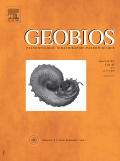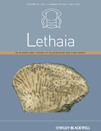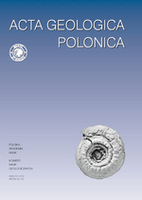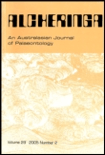
GEOBIOS
Scope & Guideline
Charting New Territories in Paleontology and Space Science
Introduction
Aims and Scopes
- Paleobiology and Fossil Record Analysis:
Research articles frequently explore the fossil record of various organisms, providing insights into their evolution, biodiversity, and the ecological contexts they inhabited. This includes detailed studies of specific taxa and their biogeographical distributions. - Biostratigraphy and Chronostratigraphy:
The journal emphasizes the importance of biostratigraphy in correlating geological strata based on fossil assemblages, aiding in the understanding of temporal and spatial patterns of biodiversity through different geological periods. - Paleoenvironmental Reconstructions:
Many studies aim to reconstruct past environments, utilizing fossil evidence to infer climatic conditions, ecological dynamics, and the interactions between biotic and abiotic factors over geological time. - Integrative Approaches in Paleontology:
The journal encourages interdisciplinary methods, combining paleontological data with geochemical, sedimentological, and stratigraphic analyses to provide a comprehensive understanding of past life and environments. - Evolutionary Biology and Systematics:
Research often focuses on the evolutionary relationships and phylogenetic implications of various fossil groups, enhancing the understanding of lineage diversification and morphological adaptations.
Trending and Emerging
- Integration of Geochemical Analyses:
There is a growing trend toward incorporating geochemical methods in paleontological studies, which helps in reconstructing ancient climates and environments more accurately, thus providing a multi-faceted view of past ecosystems. - Focus on Biogeographical Patterns:
Recent articles increasingly emphasize biogeographical studies, analyzing the distribution of taxa across different geological periods and how these distributions correlate with past environmental changes. - Diversity and Evolution of Specific Taxa:
There is an emerging focus on the detailed study of specific taxa, including their evolutionary history and ecological roles, as seen in increased publications on unique fossil groups like bryozoans and conifers. - Paleobiological Implications of Climate Change:
Research exploring the implications of past climate changes on biodiversity and evolutionary processes is on the rise, indicating an interest in how historical data can inform current ecological and climatic challenges. - Use of Advanced Technologies in Paleontology:
The application of advanced technologies, such as machine learning and imaging techniques, in paleontological research is gaining traction, enhancing the precision of fossil analysis and interpretation.
Declining or Waning
- Recent Historical Ecology:
There appears to be a waning interest in studies focused solely on recent historical ecology, particularly those that do not integrate fossil data. This might be due to a shift towards more rigorous paleontological research that emphasizes deep time analysis. - Anthropogenic Impact Studies:
Research articles addressing anthropogenic impacts on fossil records and ecosystems have decreased. This could indicate a shift back to more traditional paleontological studies rather than contemporary ecological assessments. - Microfossil Studies:
Although microfossils play a crucial role in paleobiological research, there has been a noticeable decline in publications specifically focused on microfossil taxonomy and ecology, possibly due to a broader focus on macrofossils and larger-scale ecological dynamics.
Similar Journals

LETHAIA
Unveiling the Mysteries of Life Through TimeLETHAIA, an esteemed journal published by Scandinavian University Press - Universitetsforlaget AS, serves as a vital platform for the dissemination of innovative research in the fields of paleontology as well as ecology, evolution, behavior, and systematics. Established in 1968 and continuing its impactful journey until 2024, LETHAIA has consistently contributed to advancing scientific understanding of Earth's biological and geological history. With a 2023 impact factor placing it in the Q2 category for both Paleontology and Ecology, Evolution, Behavior and Systematics, the journal is recognized for its high-quality, peer-reviewed articles that engage and challenge the academic community. Researchers, professionals, and students alike will find LETHAIA to be an indispensable resource for the latest findings, methodologies, and theoretical advancements in these interlinked disciplines.

ACTA GEOLOGICA POLONICA
Connecting researchers to the forefront of geological research.ACTA GEOLOGICA POLONICA is a distinguished journal published by the Polska Akademia Nauk, in collaboration with the University of Warsaw's Geology Department. Since its inception, it has served as a vital platform for disseminating innovative research in the field of Geology, reflecting a commitment to advancing scientific knowledge in Earth and planetary sciences. With an ISSN of 0001-5709 and an E-ISSN of 2300-1887, this journal provides a rigorous review process and is classified in the Q3 quartile for Geology as of 2023, indicating its growing influence in the discipline. Despite not being open access, the journal facilitates meaningful contributions that span a range of geological topics from fundamental research to applied sciences, thereby enriching the academic landscape. Researchers, professionals, and students alike are encouraged to engage with the valuable findings and discussions contained within its pages, which continue to shape the future of geological inquiry.

BULLETIN OF GEOSCIENCES
Advancing Earth Sciences through Innovative ResearchBULLETIN OF GEOSCIENCES, published by the prestigious Czech Geological Survey, stands as a pivotal resource in the fields of Earth and Planetary Sciences and Environmental Science. Since its inception in 2003, the journal has been committed to advancing knowledge through high-quality research, currently holding a commendable Q2 ranking in both disciplines. With its focus on diverse and innovative topics, BULLETIN OF GEOSCIENCES provides an essential platform for researchers, professionals, and students aiming to disseminate and access impactful studies. The journal is indexed in Scopus, ranking #78/195 in General Earth and Planetary Sciences and #110/233 in General Environmental Science, reflecting its significant contribution to academia. Publishing from Prague, Czech Republic, this journal invites contributions that illuminate the interactions between geological processes and environmental phenomena, ensuring an inclusive and accessible approach to crucial global issues.

CARNETS DE GEOLOGIE
Fostering Discovery in Geology and PaleontologyCarnets de Geologie is a prominent open-access journal dedicated to the dynamic fields of geology, paleontology, and stratigraphy. Published by Carnets Geologie and based in France, the journal has been a platform for scholarly communication since 2002, facilitating unrestricted access to high-quality research. With a robust impact reflected in its 2023 quartile rankings—Q2 in Geology, Paleontology, and Stratigraphy—Carnets de Geologie ranks favorably within Scopus, positioning itself at the 60th percentile for Earth and Planetary Sciences. The journal aims to disseminate innovative research findings and foster academic discourse among researchers, professionals, and students interested in the intricate aspects of Earth's history and processes. Encompassing a broad scope that reflects continuous developments in the geological sciences, Carnets de Geologie is dedicated to advancing knowledge and understanding within its community.

ALCHERINGA
Advancing Understanding in Biological and Geological SciencesALCHERINGA, published by Taylor & Francis Ltd, is a distinguished academic journal that has been at the forefront of research in the fields of ecology, evolution, behavior, systematics, and paleontology since its inception in 1975. With an ISSN of 0311-5518 and E-ISSN 1752-0754, this journal serves as a critical platform for the dissemination of high-quality research, contributing significantly to the understanding of biological and geological sciences. Ranking in the Q3 quartile for both Ecology, Evolution, Behavior and Systematics, as well as Paleontology, ALCHERINGA is well-positioned within the academic community, attracting submissions from researchers across the globe. The journal's Scopus ranks further highlight its relevance, particularly its position in the 51st percentile for Ecology and the 50th percentile for Paleontology. Although it does not operate under an open access model, ALCHERINGA remains committed to providing valuable insights and fostering discussions that are essential for the advancement of these vital scientific disciplines. Researchers, professionals, and students are encouraged to explore the profound implications of the studies published within, making it an indispensable resource for anyone aiming to deepen their expertise in these fields.

RIVISTA ITALIANA DI PALEONTOLOGIA E STRATIGRAFIA
Unveiling the Secrets of Paleontology and StratigraphyRIVISTA ITALIANA DI PALEONTOLOGIA E STRATIGRAFIA, published by Università degli Studi di Milano, is a leading open access journal dedicated to the fields of Paleontology, Geology, and Stratigraphy. Established in 1979, this prestigious journal fosters the dissemination of high-quality research and innovative studies within these disciplines, holding a commendable Q2 ranking in Geology, Paleontology, and Stratigraphy as of 2023. The journal’s commitment to accessibility since 2016 underlines its objective to promote the sharing of knowledge among researchers, professionals, and students alike. With its notable Scopus rankings reflecting a solid performance in the Earth and Planetary Sciences, particularly in Paleontology and Stratigraphy, RIVISTA ITALIANA serves as a vital resource for those seeking to stay informed on the latest advancements and discoveries within the geological sciences. For further inquiries, the editorial office is located at C/O RIVISTA ITALIANA PALEONTOLOGIA STRATIGRAFIA, VIA MANGIAGALLI, 34, 20133 MILANO, ITALY.

PALEONTOLOGICAL JOURNAL
Unlocking the Mysteries of Our Planet’s History.The PALEONTOLOGICAL JOURNAL, published by PLEIADES PUBLISHING INC, is a premier platform for the dissemination of research in the field of paleontology. With an ISSN of 0031-0301 and E-ISSN 1555-6174, this journal serves the academic community by providing insights into fossil studies, evolutionary biology, and the historical narrative of life on Earth. Despite being categorized in the Q3 quartile for 2023 and currently holding a Scopus rank of #84 out of 113 in the Earth and Planetary Sciences- Paleontology category, it remains a valuable resource for researchers and practitioners. The journal's coverage spans from 1990 to 2024, offering a comprehensive historical perspective while also addressing contemporary issues in paleological research. Scholars and students alike benefit from its rigorous peer-reviewed articles and the opportunity to access vital knowledge in the ever-evolving field of paleontology.

Palaeoworld
Illuminating the Path of Evolution Through Rigorous ResearchPalaeoworld is a leading peer-reviewed journal published by ELSEVIER, focusing on the dynamic and interdisciplinary fields of paleontology, ecology, and stratigraphy. Established in 2006, the journal aims to facilitate the dissemination of innovative research and significant discoveries that enhance our understanding of past life on Earth. With an impressive impact factor and categorized in the second quartile (Q2) for Ecology, Evolution, Behavior and Systematics, Paleontology, and Stratigraphy in 2023, Palaeoworld stands out in its commitment to high-quality scholarship. The journal is indexed in Scopus, ranking #23 in Paleontology and #14 in Stratigraphy, placing it within the top 20% of publications in these categories. As a valuable resource for researchers, professionals, and students alike, it provides unrestricted access to cutting-edge findings, detailed methodologies, and critical assessments of paleo-environmental data. This journal is not only a repository of knowledge but also a platform for advancing discussions that bridge past ecological patterns with contemporary issues.

PalZ
Showcasing Transformative Insights in PaleontologyPalZ is a prestigious academic journal in the field of Paleontology, published by Springer Heidelberg in Germany. With a long-standing history that traces back to its converged years from 1914 to 2024, this journal offers invaluable insights into the evolutionary dynamics and ecological relationships of past life forms. Holding a commendable impact factor and ranked in the Q2 category of Paleontology, it consistently showcases high-quality research that resonates within the scientific community, evidenced by its Scopus rank of #38 out of 113 in Earth and Planetary Sciences. PalZ is committed to open access, ensuring that its rich repository of scholarly articles is readily accessible for researchers, professionals, and students alike. By engaging with the journal, readers will encounter cutting-edge studies that are pivotal for advancing our understanding of paleobiology and the historical patterns of biodiversity.

Depositional Record
Charting the course of Earth's evolution through sedimentary records.Depositional Record, published by WILEY, stands as a vital resource for researchers and professionals in the fields of Geology, Paleontology, Oceanography, and Environmental Science. Since its inception in 2015, this Open Access journal has been dedicated to advancing the understanding of sedimentary processes, depositional environments, and their implications on Earth's history and contemporary climate dynamics. With an impressive array of categorizations, including Q1 rankings in Geology, Paleontology, and Stratigraphy, it underscores its significant contribution to these scientific arenas. The journal’s reach is reflected in its Scopus rankings, placing it within the top quartiles in multiple categories, indicating the high quality and impact of its published research. Researchers, students, and professionals who engage with Depositional Record will find a treasure trove of knowledge aimed at informing best practices, innovative studies, and fostering an interdisciplinary dialogue crucial for environmental stewardship and geological exploration.